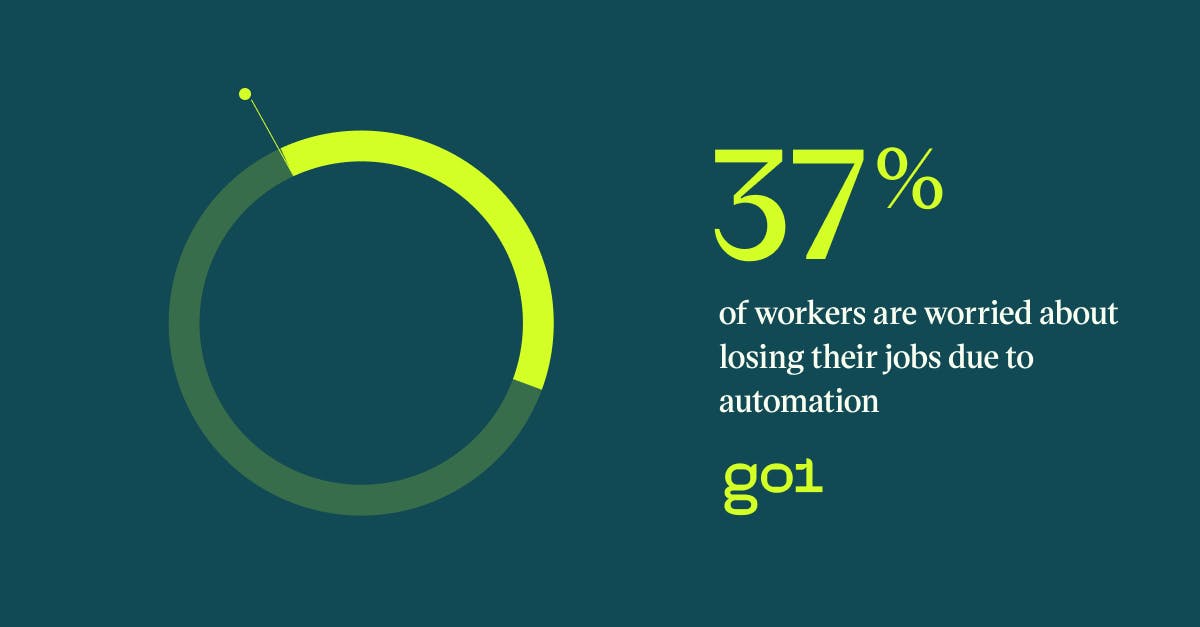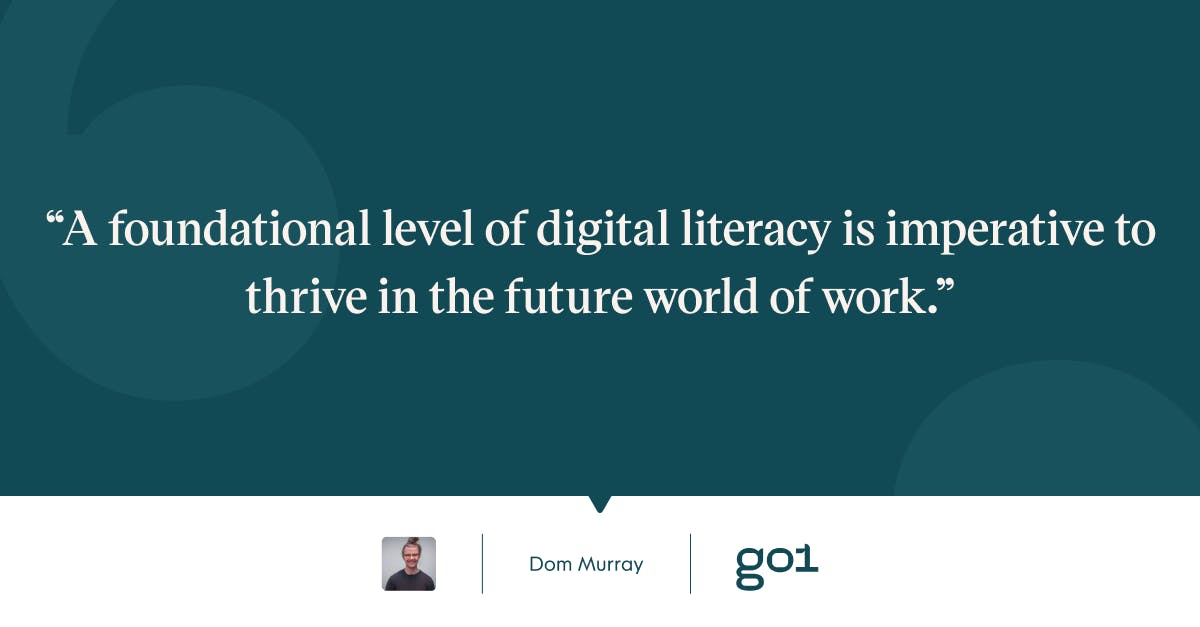
The foundational skills you’ll need in 2022

A new year often brings new learning opportunities. Given we’re all about lifelong learning at Go1, there is no more exciting time of year. Hopefully, you’re entering 2022 feeling refreshed, relaxed, and rejuvenated, meaning you’re in the perfect headspace to learn new skills and approach new challenges.
We thought we’d lend a helping hand to your new year’s learning journey by examining the foundational skills you’ll need in 2022. Whether you’re learning as a New Year’s resolution, to upskill at work, or just for the sheer love of knowledge, there are a few essential skills that you’ll need to succeed this year.
We’ll start by analysing an in-depth report by McKinsey, which outlines the skills we will all require in the future world of work, before honing in on the importance of digital literacy, understanding biases, and adaptability as key skills for the year ahead.
New year, new skills!
Future skills, now
In recent years, there has been plenty of discussion about how to develop ‘future-proof’ skills. That is, skills that will be in constant demand, surviving any technological or workplace evolutions. The thirst for future-proof skills is understandable, given some estimates show that 37% of workers are worried about losing their jobs due to automation.

For context, the World Economic Forum finds that 71% of total task-hours are currently completed by humans, compared to 29% of total task-hours completed by machines. However, if current trends continue, these numbers are expected to shift to just 58% of total task-hours completed by humans and 42% completed by machines within four years.
Perhaps most alarmingly, McKinsey believes that by 2030 “375 million workers — or roughly 14% of the global workforce — may need to switch occupational categories as digitisation, automation, and advances in artificial intelligence disrupt the world of work.”
Accordingly, many employees have focused their upskilling efforts on developing foundational, future-proof skills. A recent report by McKinsey sought to define the skills citizens will need in the future world of work by identifying these foundational skills. Following a survey of more than 18,000 people in 15 countries, they landed on 56 ‘distinct elements of talent’ (DELTAs) that will shape the future world of work. They then divided these DELTAs into four categories: Cognitive, Interpersonal, Self-leadership, and Digital.
According to McKinsey’s report, these DELTAs are vital to the future of work because “these skills showed that higher proficiency in them is already associated with a higher likelihood of employment, higher incomes, and job satisfaction.” Examples of DELTAs include resolving conflicts, collaboration, digital learning, empathy, self-confidence, data literacy, active listening, and many more.
You can read the full report, including all 56 DELTAs, here. However, we have identified the top three foundational skills from McKinsey’s DELTAs that stand above the rest in their importance to the future of work.
Digital literacy
According to McKinsey’s analysis, digital literacy is “the ability to handle digital data, use popular software, access digital services, and interact with AI…individuals regularly use the internet, access services digitally, use popular software, and understand that online activity creates data that others can use.” Notably, McKinsey also found that the digital literacy DELTA had the highest correlation to education.
We’ve discussed digital literacy extensively in the past, but it’s worth reemphasising how significant digital literacy will be as a foundational skill for many years to come. Given the sheer volume of new technologies we are now exposed to at work — from video conferencing and chat tools to word processors, AI, clouds, and everything in between — a foundational level of digital literacy is imperative to thrive in the future world of work. Without a working understanding of digital literacy, many employees are likely to be left behind as new technological trends continue to arrive at breakneck speeds and the demand for digital skills grows exponentially.

Despite this, many teams have not yet taken action to improve their digital literacy. For instance, 39% of L&D teams say they are overwhelmed and under-equipped due to the pace of technological change. More alarmingly, digital literacy expert Elizabeth Marsh recently found that 88% of organisations have not taken any action to address their employees’ lack of digital skills. Given this, while digital literacy is clearly in demand, many people still lack this skill, making it a key area of focus in 2022.
For more insights on the importance of digital literacy, be sure to read our blog on Steps to improve your team's digital literacy.
Understanding biases
Understanding implicit and explicit bias is fundamental to creating a healthy and productive workplace culture. According to McKinsey’s research, people who understand biases are 10% more likely to have higher job satisfaction. They define the ‘understanding biases’ DELTA as “individuals are aware of biases in their thinking and can usually ensure they do not impair their thought processes and decisions.”
Examples of unconscious workplace biases are pervasive. For example, research shows that candidates with stereotypically ‘foreign-sounding’ names receive 50% fewer interview callbacks. Similarly, in America, 15% of the male population are taller than 6 foot. Yet, 60% of corporate CEOs are 6 feet or taller. Finally, a study by Yale University found that a group of male and female scientists, who were all trained to be objective, were more likely to hire men, consider men more competent than women, and pay men $4,000 more per year than women.
As such, biases influence almost every aspect of workplace culture — whether we realise it or not. Often, these biases cause us to make unconscious judgments. While overcoming bias is not a straightforward process, it is necessary to foster more diverse and inclusive workplaces.
Behavioural scientist Dr Pragya Agarwal offers insightful advice on acknowledging and overcoming biases. She explains, “the more we talk openly about our biases — individual, interpersonal, and systemic — the more it helps...as does having more conversations involving different communities.”
For more insights on understanding biases, be sure to read our article on Unlearning unconscious biases in L&D.
Adaptability and coping with uncertainty
It should be no surprise that these two skills are in particularly high demand in 2022. Given the challenges of the pandemic, adaptability and coping with uncertainty are now non-negotiable skills. This trend shows no signs of slowing down in 2022, meaning adaptability and coping with uncertainty will continue to be essential foundational skills in the future world of work.
In fact, according to McKinsey’s research, adaptability and coping with uncertainty are the two highest indicators of employability. Respondents with a high level of adaptability were 24% more likely to be employed, while respondents who scored highly in the 'coping with uncertainty' DELTA were 18% more likely to be employed. Notably, ‘self-motivation and wellness’ was the DELTA with the highest indicator of job satisfaction. Respondents who scored highly in this category were 23% more likely to be satisfied with their jobs.
Further research demonstrates how important adaptability is in the modern workplace. According to PWC, 63% of CEOs are unable to find talent that can adapt to the requirements of the business. Likewise, Barclays Lifeskills finds that 60% of employers believe adaptability has become more important this decade than ever before. Despite this, only 8% of employers actively offer adaptability training. What's more, just 15% of people list adaptability as a skill on their CV.
As such, there is a significant disconnect between the skills employers crave and the skills that many employees are currently developing. If COVID has taught us anything, it’s that adaptability is now one of the few constants in life. Therefore, adaptability and coping with uncertainty are vital foundational skills to hone in 2022.
For more insights, be sure to subscribe to the Go1 newsletter to stay on top of all the latest L&D trends. Or, you can book a demo today to find out how Go1 can help with your team’s learning needs.




